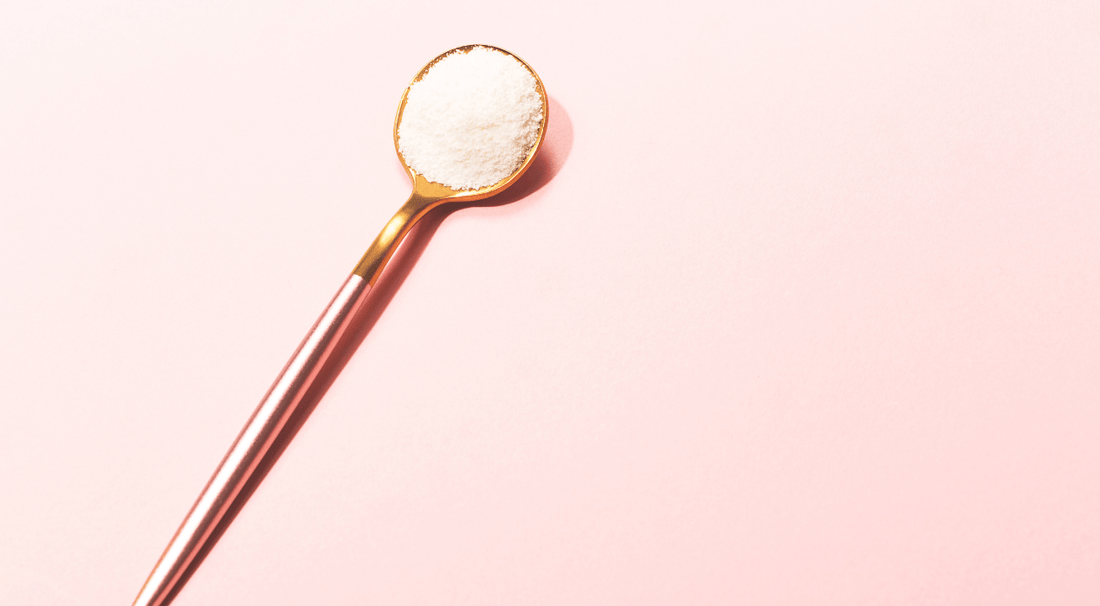
Collagen peptides contain a unique composition of valuable amino acids.
The following 18 amino acids are found in collagen:
- Alanine
- Arginine
- Aspartic Acid
- Glutamic acid
- Glycine
- Histidine
- Hydroxylysine
- Hydroxyproline
- Isoleucine
- Leucine
- Lysine
- Methionine
- Phenylalanine
- Proline
- Serine
- Threonine
- Tyrosine and
- Valine
Collagen is the most important protein in the body and it has a very unique molecular structure that contains very high levels of 3 amino acids in particular - glycine, hydroxyproline and proline. These three amino acids connect which the other amino acids in a triple helix shape, which gives collagen the amazing strength but incredible flexibility, as we see in our skin.
What are amino acids?
Amino acids are organic compounds that our cells use to build proteins. These proteins are then used to build our muscles, skin, cartilage, bones, organs and blood and to even synthesise neurotransmitters and hormones and protect us from infection and illness.
Basically, amino acids are proteins that are the building block of life that enable our bodies to grow, heal, build, repair and rejuvenate.
When you consume a collagen supplement, you are ingesting a very pure and very easy-to-absorb form of protein. The body will use this protein in one of three ways:
-
1/ It will break down the proteins into individual amino acids and send these to our cells to build proteins.
-
2/ It will absorb the amino acid peptides (small groups of protein) in the collagen and use these directly, and/or
-
3/ The collagen peptides will initiate a response in the small intestine that signals the body to produce fibroblasts (cells responsible for connective tissue and collagen formation) and osteoblasts (cells responsible for bone formation).
There are three groups of Amino Acids:
-
1/ Essential amino acids
-
2/ Non-essential amino acids
-
3/ Conditional amino acids
The body cannot make essential amino acids - food or supplements from food must supply them.
There are nine essential amino acids: histidine, isoleucine, leucine, lysine, methionine, phenylalanine, threonine, tryptophan, and valine.
2/ Non-essential Amino Acids
Our bodies can produce the non-essential amino acids without food.
The non-essential amino acids are:
Alanine, arginine, asparagine, aspartic acid, cysteine, glutamic acid, glutamine, glycine, proline, serine, and tyrosine.
Conditional amino acids are not essential but are important in times of illness. They include: arginine, cysteine, glutamine, tyrosine, glycine, ornithine, proline, and serine.
Does collagen have all of the essential amino acids?
Collagen contains eight of the nine essential amino acids, which are:
- Histidine
- Isoleucine
- Leucine
- Lysine
- Methionine
- Phenylalanine
- Threonine
- Valine
What is the most common amino acid in collagen?
The most common amino acid found in collagen is glycine, one of the amino acids essential to the body's synthesis of the antioxidant glutathione. Glycine contributes to cellular growth and overall health. Cells produce glutathione to fight off free radicals that can cause oxidative stress and damage cells, proteins, and DNA.
Is collagen a good source of amino acids?
The answer is yes; collagen is an excellent source of amino acids.
Collagen is a functional food source. Its active peptides and 18 amino acids can optimise health and address physiological issues posed by ageing, stress, gut dysfunction, injury, illness and exercise.
A high-quality hydrolysed collagen protein powder supplement can give your body a very pure and very easy to absorb form of protein that can support your hair, skin, nails, bones, muscles, joints, ligaments, organs, brain, sleep, gut health and fitness or exercise regime.
Available in UK & EU only
Available in US only
The information we have provided herewith, and all linked materials, are not intended nor should they be construed as medical advice. Moreover, the information herewith should not be used as a substitute for professional medical expertise or treatment. Please refer to our Terms and Conditions and consult your General Practitioner for advice specific for you.


